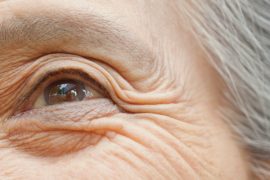By Holly Marley-Henschen, Kate Lawless and Katy Macek
According to the National Institute of Mental Health, nearly one in five U.S. adults, or 51.5 million people, live with a mental illness.
Of this number, 13.1 million adults aged 18 or older have what’s considered a “serious mental illness,” which is “defined as a mental, behavioral or emotional disorder resulting in serious functional impairment, which substantially interferes with or limits one or more major life activities.”
Though mental health awareness is much more prevalent (and has become more so due to the pandemic), mental health disorders are still considered “invisible illnesses.” We talked to four area women who have serious mental illnesses to find out what life is like for them and how we can best support our loved ones.
ON SCHIZOAFFECTIVE DISORDER BIPOLAR TYPE
Mary, 40, who asked to be identified only by her first name, is an outreach worker at Journey Mental Health and member of Journey’s Yahara House. At 30, she was diagnosed with Schizoaffective Disorder Bipolar Type — a type of mental illness that’s characterized by both schizophrenia and symptoms of a mood disorder (in Mary’s case, bipolar) — that can lead to episodes of mania and, in cases such as Mary’s, depression.
As told to Katy Macek
I was first diagnosed with ADHD, and those meds made me more psychotic than I really am. I struggled with that, and had a big psychotic break in my 20s. I would have trouble with thinking people were following me around to work and school. I thought I was part of a psych experiment and I was paranoid about my teachers. I worked a lot, tried to do a lot at once and I got so stressed out. I had reality issues where it was hard to distinguish between the two. It was kind of scary, but fortunately, it was only temporary.
When I started hearing voices, I was like, “This is enough.” I went to the hospital for two weeks. It was helpful to be on medication, though it took me a while to find the right ones. I realized no one was following me, and I wasn’t part of an experiment.
I’ve been working on my recovery now for 10 years. It doesn’t happen overnight. Since I have lived experience with mental illness, I joined Yahara House. It provides a community for me to belong to, and it gives me confidence to work on my goals, such as getting off disability. I really believe in working during my recovery, because it helps me feel connected; gives me purpose. For me, recovery is adding structure to my life. I’m very much like a person without my condition in many ways. I do yoga, volunteer at a thrift store, work at a grocery store, run a support group at SOAR-Recovery Dane. I’m also a licensed massage therapist.
I might think about things a little too much, wonder about people, but I have to remember people are just living their lives. People are usually pretty good. I don’t necessarily believe these thoughts, and it is annoying to have those thoughts. I don’t believe everything I think after I think it, which can be good and bad. Sometimes I have to talk things out with my therapist, but I can often do reality checking on my own.
I think being a person with lived experience has helped me connect to other people with mental health diagnoses. I can’t relate to everybody, but can relate to a lot of people.
If you would have asked me if I would have become disabled in my 20s, I would have been like, “No way.” I still struggled with things then, had mood problems and insomnia, but I didn’t think it was a problem.
I think sometimes a symptom I have is that I don’t think anything is wrong with me. I like to realize I do have a mental illness.
I run a support group for people who hear voices, and I learned from the people in my group about my own symptoms. It’s a good way to build connections and support.
The stigma of my mental illness is probably worse than the illness itself. I don’t tell everybody about my illness, but I think it’s healthy for me to share, because then I can be more open and honest.
I do think it’s harder to get jobs, and I gained a lot of weight because of the medications. There are a lot of downfalls, but I’m much clearer-headed, more grounded on my medication, so I appreciate them. It makes me more thankful than I was before I was diagnosed. I appreciate each day being above ground.
I can still live a full, happy and meaningful life despite my mental health diagnosis. There’s so much negativity and stigma — that it’s a scary disease, [that there’s] no hope for people when they have that diagnosis. But I find that my life is pretty good.
ON PARANOID SCHIZOPHRENIA
Sonja Traverse was diagnosed with paranoid schizophrenia at age 29, after a long struggle with depression and a psychotic episode that friends, family and even doctors didn’t recognize as a mental health disorder until she was hospitalized. Paranoid schizophrenia includes symptoms of delusions and hallucinations, blurring the line between what is real and what is not.
As told to Katy Macek
I’ve had several episodes in my lifetime where I get paranoid and start hearing voices, or feel like the TV is talking to me. I’d get delusional and suicidal, and I didn’t really trust people in my life. Luckily, with medication, I don’t feel that way anymore.
In my 20s, I was living with some roommates and wasn’t getting out of bed, wasn’t working — just really bizarre behavior. I would quit my jobs because I thought [my coworkers] hated me. I didn’t know
what was going on with me; I thought it was just my reality. Finally, my dad told my friends to get me to the emergency room. Because I was suicidal, the ER admitted me to a psychiatry unit, where I was diagnosed with severe depression.
I went several years without medication, and then it just got so bad I couldn’t function. That’s when I got diagnosed with paranoid schizophrenia. I got medication, but I went off it because I was paranoid the doctors were making up a fake diagnosis. I didn’t think it was real that I had schizophrenia. When I went back to the hospital, I learned that it is real and can be managed by medication.
After my diagnosis, I accepted that I don’t have to live a life like most of my friends do, or what might be expected of a young woman. So many times when I was struggling my parents would say I just needed to get back to work. That wasn’t the solution for me.
I took the stress of the expectation that your job defines who you are out of my life, and I started to do things that just feel good to me. The biggest thing was getting connected with Yahara House, which a psychiatrist told me about. That’s where things really started to turn around for me. I had a place to go and a community that feels more like a family with both members and staff.
Just like with any diagnosis, it doesn’t take away from the person you are. It doesn’t take away from your hopes and dreams about who you want to be. The stigma about mental illness is that you act like a crazy person, act weird, and that’s not necessarily true. We’re just as hu- man as anybody else, we just have something different going on in our brains.
For example, if I were to go to a really busy place, I might be suspicious of why other people are there, or think they are talking about me. I might be suspicious of signs or messages, thinking there’s more meaning behind it than there is. So, I try to take myself out of the situation a little bit and look at what is actually happening versus what I’m reading into. It helps to have somebody that I trust with me, so I can talk about it.
There’s such a stigma about mental illness that you’re less of a person. Yahara House works with you to take your strengths and see what you can do as opposed to what you can’t. The biggest thing it’s taught me is that people with mental illness are still people, we still want the same things everybody wants: relationships, a community, a fulfilling life.
ON POST-TRAUMATIC STRESS DISORDER
Jamie Fritsch had been in therapy since high school and realized an episode from when she was age 11 tied back to her diagnosis of post-traumatic stress disorder. After years of mental health counseling, she’s learned to live — and thrive — with multiple mental health challenges.
By Holly Marley-Henschen
One day in July 2016, Jamie Fritsch went to her job of nearly 20 years at a grocery store deli in Monroe. But she doesn’t remember any of it.
“I made it through like three-quarters of my shift in a blackout state. I was told that I was using a meat slicer,” says Fristch, now 52. Her coworkers noticed something was wrong and pulled her aside. Then one of them took her to the home she shared with her mother.
“My brother was there and he and my mom told me, ‘You’re gonna go to the hospital or we’re going to call the police,’” she says. Fritsch had intentionally overdosed on her own prescription medication. It wasn’t the first time.
Up until that point, she had survived a lifetime of depression, cutting and several suicide attempts. “I was in a place of such darkness that I didn’t know how to pull myself out of anymore,” she says.
Fritsch had been in therapy since high school, after her first overdose. Though she wouldn’t recall it until much later, someone she knew had sexually abused her at age 11. She buried the memories for decades. When they came back, she was diagnosed with post-traumatic stress disorder (PTSD). By 2016, she’d been hospitalized 10 times in psychiatric units and at Winnebago Mental Health Institute in Oshkosh.
“When I was in a hospital, it was like putting a Band-Aid on it sending me home. I didn’t know anybody who wanted to take that time to sit and talk to me and say, ‘Why are you behaving this way?’
PTSD is a long-term response of the nervous system after trauma. Symptoms include intrusive thoughts and flash- backs, avoiding reminders of the trauma, and distorted thoughts and feelings about the trauma and oneself, according to the American Psychiatric Association. PTSD survivors are prone to altered states of arousal and reactivity, from anger and reckless behavior to paranoia and issues concentrating or sleeping.
After her most recent overdose, Fritsch’s quality of life was low. In public, she felt anxiety and paranoia. At home, she slept much of the time. She avoided eating, grooming herself and doing housework. But the overdose shook her.
“It took that much for me to realize, ‘Hey, I have to step up and do this; I have to try.’ Because I knew if I didn’t, I wouldn’t be here,” she says.
Fritsch checked into a residential program at Rogers Behavioral Health in Oconomowoc. Initially, she dismissed the treatment. One night, though, a staff member asked her how she was doing. When she replied that she was fine, the facilitator saw through her. “That someone would not just enable my behavior, but call me out on it — it was the best thing that could ever have happened to me. From that day forward, I had a totally different outlook,” Fritsch says. Taking part in cognitive behavioral and exposure therapies, she learned to monitor her thoughts and be more honest and assertive about her feelings. She spent five weeks in intense, consistent therapy followed by several weeks of partial hospitalization in Madison after being released.
Since leaving treatment, Fritsch reconnected with her high school sweetheart, and they were married in 2019. In early 2020, she was diagnosed with kidney cancer. This past February, she got a clean bill of health. Fritsch has drawn disability benefits since losing her job and insurance coverage after her cancer diagnosis. She lives with her husband and his mother in Monroe. She likes to read fantasy and true crime books.
Fritsch has learned to juggle her multiple diagnoses of PTSD, Bipolar Disorder, Attention-Deficit/Hyperactivity Disorder and Borderline Personality Disorder. During the pandemic, she’s worked at stay- ing connected to people so she doesn’t revert back to withdrawing from social situations. If she’s anxious, she practices breath relaxation and questions her obsessive thoughts. “I get panic attacks going to stores, and I just tell myself that I’ve gotten through [it before],” she says.
Fritsch says it’s been a long road, but her journey isn’t over yet.
“I’d be lying if I said every day was sunshine and roses. It’s not, and I have depressed days, but I don’t have them like I used to,” Fritsch says. “And I have not been back to that really dark place.”
ON EATING DISORDERS
Lolita Lang describes what having an eating disorder is like and how she first identified the root causes of her struggles. Because eating disorders are complex, sometimes they are tied to other mental health conditions — like it was for Lang.
By Holly Marley-Henschen
Lolita Lang felt self-conscious about her weight from a young age. She remembers riding in a car with her mother around age 11.
“She turns and looks at me and says, ‘Look at that belly!’ I thought, ‘Oh my gosh, like what does she think about it? Is it too big? Is it bad?’” Lang says.
At just 26, Lang has struggled with eating disorders for much of her life. She’s now recovered, but that success didn’t come easy.
Lang, who lives in Lodi, started playing competitive volleyball in fifth grade. Around the same time, she began comparing her body and weight with her teammates. As a high school freshman, stress and depression began to affect her, and that’s when she started bingeing and purging.
“I ended up using it as a coping [mechanism] for emotions that I didn’t want to feel,” Lang says.
Though her family seemed normal from the outside, things weren’t OK at home, and it fed into her eating disorder — a disorder that’s associated with a lack of control. Her father, an alcoholic and addict, was convicted twice for felony drug possession. Halfway into Lang’s junior year, he attempted suicide at home. Soon after, she was hospitalized for mental health issues.
At age 17, Lang started taking prescription medications that made her lose her appetite. She and her mother bonded over her weight loss. “She’d get really excited. And I was like, ‘Oh, great. I’m making my mom happy,’” she says. Then she began to restrict her eating.“Food was like poison — it scared me so much to eat it. I was scared that if I ate three grapes, I was going to gain 10 pounds.”
During an inpatient treatment program for obsessive-compulsive disorder, which is often connected to eating disorders, a therapist noticed Lang’s symptoms. She had dry skin, hair loss and difficulty concentrating. Convinced she was actually gaining weight, she refused to eat and was eventually hospitalized for an eating disorder.
For the next few years, Lang was in and out of hospitals and treatment programs, such as at Rogers Behavioral Health. Sometimes, she didn’t want to be there.
Other times, she got bursts of enthusiasm to work toward recovery. But oftentimes, insurance would cover the inpatient and residential treatment, for example, but not the transitional, part-time programs that helped reinforce new behaviors.
At the same time, Lang did her best to live like a normal young woman. But she also struggled with post-traumatic stress disorder, as well as suicidal ideation and a few attempts. Between hospitalizations, she was able to complete one semester of community college classes. Then, when Lang was 22, someone raped her. She checked into treatment and devoted herself to getting better. “I just realized how miserable I was,” Lang said. “I was like, I want more than this. I want to be able to go to school, I want to be able to work a job,” she says. Lang adopted coping skills and healthy eating habits with support from counselors in a group setting.
Since April 2018, Lang has considered herself recovered from eating disorders. She eats intuitively with guidance from balanced meal plans. She’s also accomplished a major challenge for eating disorder survivors: accepting her weight — even though it’s the highest it’s ever been.
“I would rather be happy at the weight I’m at than miserable at a weight that I still will never reach,” Lang says. “Even though I may not agree with everything with my body, I’m glad I’m in it, because my life is so much better in it.”
Lang recently reached another milestone. After living primarily with her mother since high school, she moved into her own apartment in August. She lives with her cat, Ethel, a 9-year-old tuxedo.
Lang collects disability benefits and has some income from babysitting and cleaning a few days a week. At first, work brought on anxiety attacks. But Lang managed to handle strong negative emotions by taking walks and exercising. She still likes to play volleyball and hopes to get back to visiting new places with friends once the pandemic is over. Her family has healed together, though her father passed away in 2018. She’s close with her sisters, nieces and a nephew. She and her mother now have a healthy, supportive relationship.
Lang hopes to work as a patient care technician at a facility like Mendota Mental Health Institute. “People need people that have struggled to be able to help them,” Lang says.
For more on how you can best support your loved ones who are dealing with mental health issues, click here.
Here for HELP
There are a number of mental health organizations that offer assistance and resources. Some of the organizations below relate to the profiles we feature in this article.
- Journey Mental Health Center
(608) 280-2600 for mental health emergencies; (608) 280-2720 for appointments | journeymhc.org
Journey offers several programs from individual therapy to substance abuse treatment to programming for patients of African descent (the Ujima Program) and Clinica Latina, for Spanish speakers. - Madison Major Healthcare Providers
Group Health Cooperative, SSM Health, UnityPoint Health and UW Health all offer behavioral health services. - National Alliance on Mental Illness
(800) 950-NAMI
Text NAMI’s HelpLine for mental health resources or search nami.org for text and chat options. - National Crisis Text Line
Text “HOME” to 741741 for free, 24/7 crisis support from a trained crisis counselor. - National Eating Disorders Association
(800) 931-2237 for support, resources and treatment options. nationaleatingdisorders.org - National Suicide Prevention Lifeline
(800) 273-8255
A national network of crisis centers that are available 24/7 for free, confidential support. - Rogers Behavioral Health
(800) 767-4411 | rogersbh.org
Rogers assists children through adults with things like eating disorder recovery and depression and offers online options, like a virtual OCD support group.




